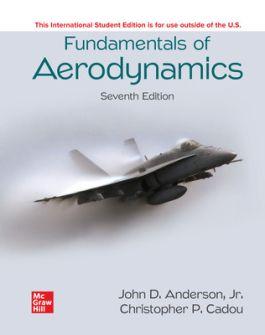In a thermally perfect, but not calorically perfect gas, the specific heat at constant pressure can no
Question:
In a thermally perfect, but not calorically perfect gas, the specific heat at constant pressure can no longer be considered constant. How would this affect the prediction of the stagnation temperature of air flowing at \(300 \mathrm{~K}\) and \(1500 \mathrm{~m} / \mathrm{s}\)?
a. Begin by showing that the differential form of the energy equation for steady, 1-D, constant area, adiabatic flow is:
\[ \begin{equation*} d h+u d u=0 \tag{7.2} \end{equation*} \]
b. Integrate Equation 1 assuming \(c_{p}\) is constant to recover the simple 1 -D expression for energy conservation along a streamline.
c. Now, incorporate the effect of temperature variation by representing the specific heat of air as a power law in temperature ( \(\mathrm{T}\) is the temperature and the units are \(\mathrm{J} / \mathrm{kg} \mathrm{K}\) )
\[ c_{p}=996.96+(0.0357) T+(0.0002) T^{2}-(8 E-8) T^{3} \]
d. Use your result to determine the total temperature of air having a static temperature of \(300 \mathrm{~K}\) and a velocity of \(1500 \mathrm{~m} / \mathrm{s}\) assuming variable specific heat. Note that you will have to use an iterative approach to get the temperature.
e. How does this differ from the result assuming constant specific heat (pick the value corresponding to \(300 \mathrm{~K}\) )?
f. Based on what you have seen here, under what conditions would it be important to consider the temperature variation of specific heat when predicting the total temperature?
Step by Step Answer:

Fundamentals Of Aerodynamics ISE
ISBN: 9781266076442
7th Edition
Authors: John D. Anderson, Jr, Christopher P Cadou





